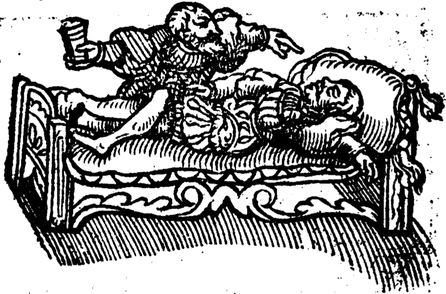The Art of Physick
Section B. Of the 6 Non-Naturals
3. Of Sleeping and Waking
Neue Artznei und Practicierbuchlin, Bock, 1551
|
D. What Sleep is requisite for the Health of the Body?
C. Quiet, Sound and Moderate; for that Sleep is not commendable, which is disturbed with restless Dreams; nor so slight, as to be disturbed with the least noise; worst of all immoderate sleep; for it hinders the due expulsion of the Excrements out of the Body, and detains them beyond their time; it begets abundance of Superfluities, renders the Brain more Cold and Moist, breeds the Headache, and causes Drowsiness of the Mind, and Dullness of the Senses. D. How long time may a may be allowed for Sleep? C. Of this Judgement is to be made from the perfect Concoction of the Elements; for no certain time can be ascribed to all persons, in regard that some concoct sooner, some later. However for the most part, six, seven, or eight hours at most is to be allotted for the time of sleep: But for the determining the proportion of sleep, we must consider the Temper, Age, Nourishment received, and Labor the person has undergone, for the Bilious require more sleep then the Phlegmatic, Old men then Young men, they that feed more liberally, then they that feed sparingly; and they that have labored either with Body or Mind, then they that have used none. D. Which is the best way for a man to lie when he takes his rest? C. Let a man lie first upon his right side, that his Meat may descend more quickly to the bottom of the Stomach; then upon his left, that by the Stomach’s resting toward the Liver, concoction may be forwarded; which done, let him turn again upon his right side, that the Chylus may be more easily distributed to the Liver. Add to this, that the shifting of sides in the manner, does not a little refresh the weariness of the Body. Lying upon the Back is condemned by all, as being the occasion of many Diseases; and lying upon the face is bad for those who are troubled with delfuxions of the Eyes. D. What time is more wholesome for Sleep? C. The most convenient time is the Night, two or three hours after Supper; the Night being most fit for Sleep, by reason of its Moisture and Tranquility. Besides, that it affords time enough to perfect the Concoction of the Meat, there being no occasion for a man to disturb his through exigency of business. On the other side, sleeping by day is most pernicious, because it fills the Brain with too much moisture, which ought rather to be dried up by waking. D. What Waking is most wholesome? C. As moderate Sleep is wholesome, immoderate hurtful, the same is to be said of waking; for as too much Sleep over-cools and moistens the Brain, so excess of waking weakens the Temper of the Brain, debilitates the Senses, hinders Concoction, and begets Crudities; for that while a man wakes, the Natural Heat together with the Blood and Spirit, keeps out in the external parts, so that as the Night is the Season for Sleep, so is the Day for Waking: Wherefore it was the Precept of Hippocrates, to sleep by night, and wake by day; for the night causes a better concoction, and the day a better distribution of Nourishment, and the expulsion of Excrements. Besides the Animal Faculty is more encouraged to Labor in her Functions by the heat and light of the Day. |
Excess Sleep, and especially during the day is said to increase Phlegm and dull the Mind. Ayurvedic texts state the same. The Heat of a Bilious (hot) body is cooled by long sleep; Phlegmatic people are benefited by short sleep while Phlegm is increased by long sleep. Chylus: the juice of digested food |
The Art Of Physick
Section A.
OF THE 7 NATURALS
(Physiology)
Introduction to the 7 Naturals
1. Elements
2. Temperaments
3. Parts
4. Humors
5. Spirits
6. Faculties
7. Actions
Section B.
OF THE 6 NOT-NATURALS
(Preservation of Health)
Introduction to the 6 Not-Naturals
1. Ambient Air
2. Food and Drink
3. Sleep and Waking
4a. Exercise &
4b. Rest
5. Excrements
6. Emotions (Passions of the Mind)
Section C.
OF THE 3 PRETER-NATURALS
(Pathology)
1. Diseases
2. Causes
3a. Symptoms &
3b. Signs
Section A.
OF THE 7 NATURALS
(Physiology)
Introduction to the 7 Naturals
1. Elements
2. Temperaments
3. Parts
4. Humors
5. Spirits
6. Faculties
7. Actions
Section B.
OF THE 6 NOT-NATURALS
(Preservation of Health)
Introduction to the 6 Not-Naturals
1. Ambient Air
2. Food and Drink
3. Sleep and Waking
4a. Exercise &
4b. Rest
5. Excrements
6. Emotions (Passions of the Mind)
Section C.
OF THE 3 PRETER-NATURALS
(Pathology)
1. Diseases
2. Causes
3a. Symptoms &
3b. Signs


